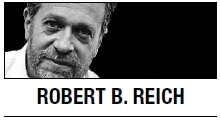The 19 firefighters who died battling a huge wildfire near Prescott, Ariz., presumably were motivated by something other than rational self-interest. Like the first responders to 9/11 and other emergencies, and members of the armed forces, those firefighters put themselves in harm’s way (or chose a job that did so) because they wanted to serve.

Economics, and much of public policy and political strategy, assume that people are motivated by self-interest, that the definition of acting rationally is to maximize what you want for yourself, and that other values ― service, duty, allegiance to others, morality and shared ideals ― are either irrelevant or negligible.
Ayn Rand, the philosophical guru of modern conservativism, popularized this view of human nature. In her world, selfishness is the only honest and justifiable motive. By looking out for Number One, we accomplish everything that’s necessary. Economist Milton Friedman extended the logic: The magic of the marketplace can be relied on to allocate resources to their highest and best uses. Anything “public” is suspect.
The titans of Wall Street and the CEOs of our major corporations have put this narrow principle into everyday practice. In their view, the aggregation of great wealth and maximization of profit is the only justifiable motive. Greed is good. Eight-figure compensation packages are their due. People are paid according to their economic worth.
This crimped perspective misses what’s most important. Shared values are the essence of a society. They fuel not only acts of valor, such as those of these 19 young firefighters, but also motivate people to become teachers and social workers, police officers and soldiers, librarians and city councilors.
And they generate social movements ― abolition, women’s suffrage, civil rights, environmental protection.
Shared values even determine how the economic game itself is played.
We decide through our elected representatives and the courts what can or cannot be owned (not the human genome or slaves, for example), what should or should not be bought and sold (not votes or heroin), and what should be freely accessible to everyone (schools, clean air).
Empirical evidence shows that most people sacrifice their own comfort or convenience for what they consider to be shared values. They’re motivated by compassion, empathy, loyalty and duty. They offer their seat on a crowded bus to an elderly person or a pregnant woman. They volunteer their time and money to a charity. They help someone in distress. They take an active role in their community.
And contrary to much conventional political wisdom, most people don’t vote according to their narrow self-interests. They vote according to their values ― what they believe is good, right and fair. Wealthy urban voters are more likely to support strong safety nets, for example, than middle-class rural voters.
Most Americans, of whatever class or political persuasion, believe that everyone should have a chance to make the most of themselves, and that someone who works full time should be paid enough to lift herself and her children out of poverty.
What, after all, is patriotism other than a willingness to sacrifice for the common good? The first word in the Constitution of the United States isn’t “I.” It’s “We.” “We the People of the United States” join together.
When arguing against paying their fair share of taxes, some wealthy Americans claim “it’s my money.” They forget it’s their nation, too. And unless they pay their fair share of taxes, America can’t meet the basic needs of our people. True patriotism means paying for America.
Most human beings want to be part of something larger than themselves. They crave moral purpose and social solidarity.
If we overlook this, we fail to understand the means and meaning of social progress.
By Robert Reich
Robert Reich, former U.S. secretary of labor, is professor of public policy at the University of California at Berkeley and the author of “Beyond Outrage,” now available in paperback. He blogs at www.robertreich.org. ― Ed.
(Tribune Media Services)





![[Exclusive] Hyundai Mobis eyes closer ties with BYD](http://res.heraldm.com/phpwas/restmb_idxmake.php?idx=644&simg=/content/image/2024/11/25/20241125050044_0.jpg)
![[Herald Review] 'Gangnam B-Side' combines social realism with masterful suspense, performance](http://res.heraldm.com/phpwas/restmb_idxmake.php?idx=644&simg=/content/image/2024/11/25/20241125050072_0.jpg)

